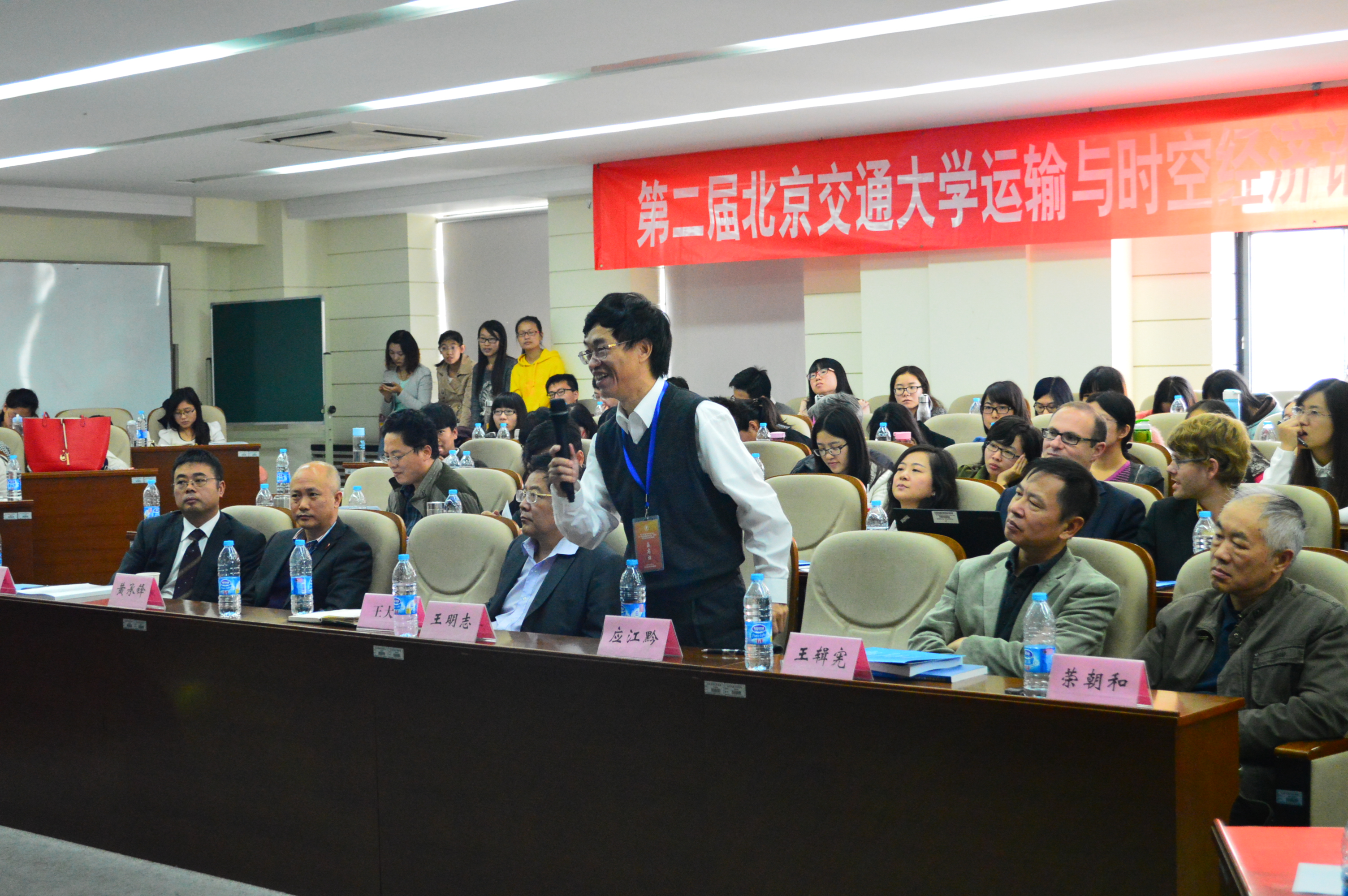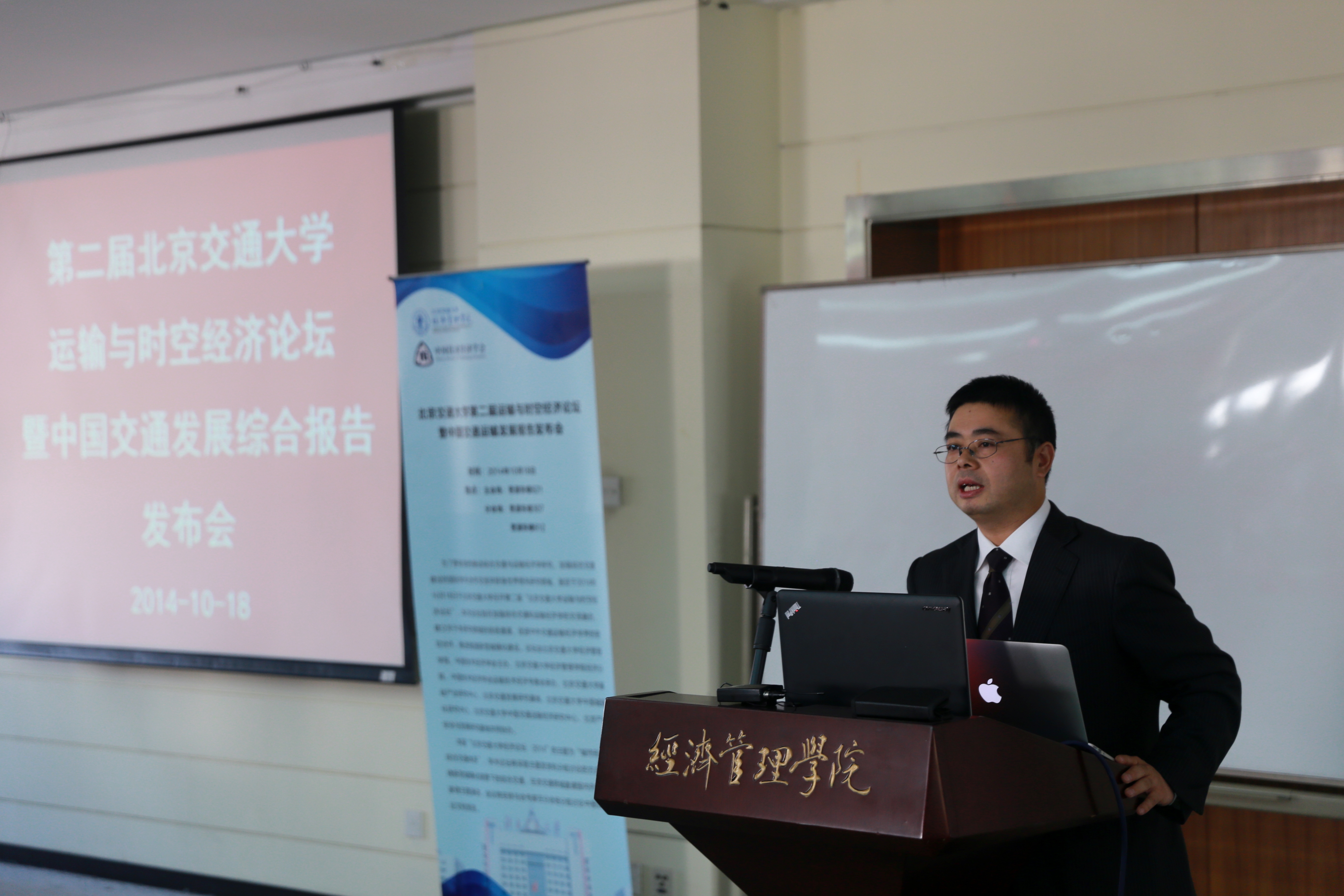Metropolitan is an important stage of Chinaos urbanization that cannot be crossed
--- Second Forum on Transportation and Temporal Economy and Press Conference of Integrated Report on Chinaos Traffic Development were held in our school
Second Forum on Transport and Temporal Economy, with the theme of City Pattern and Integrated Transportation System, was held in our university on October 18, 2014. Over 120 people attended this forum, including Deputy Director Zhang Tai from Research Institute of the State Council, Deputy Director Wang Mingzhi from the Ministry of Transport, Prof. Ying Jiangqian from Gifu University of Japan, Prof. Xu Jiang from the Chinese University of Hong Kong, Prof. Wang Jixian from Hong Kong University, Prof. Hilmola Olli Pekka from Lappeenranta University of Technology, Gerald Ollivier from the World Bank, Leaders of School of Economics and Management Zhang Qiusheng and Shi Xianliang, Professors of Economics and Management Rong Chaohe, Zhao Jian, Ou Guoli, and Lin Xiaoyan, and experts from institutes and universities like the Chinese Academy of Sciences, Chinese Society of Technology Economics, China Academy of Railway Sciences, Peking University, University of International Business and Economics, Wuhan University of Technology and Chongqing Jiaotong University. Many teachers and students of our university also attend the forum. This forum reached a successful conclusion that very day.
Prof. Shi Xianliang, Vice President of School of Economics and Management, hosted the opening ceremony of the forum.
Prof. Zhang Qiusheng, President of School of Economics and Management, addressed on behalf of the School. He warmly welcomed those leaders, experts and scholars attending the forum. He said, the Second Forum on Transportation and Temporal Economy emerged out of requirement for better research on development regularities of city Pattern and transportation system, for improving international academic communication and cooperation on integrated transportation and making those related research leading the world, for a platform where related Chinese scholars can communicate their thoughts and lessons. This forum also provides an important high-level opportunity for Beijing Jiaotong University to communicate with and learn from the outsides, which will promote the construction and talent training in such disciplines as economics, management and transportation. Prof. Zhang wished the forum would achieve fruitful results, and advanced development of Chinaos integrated transportation and industrial economy.
Then Press Conference of Integrated Report on Chinaos Traffic Development were held. This report is a white paper book project supported by the Ministry of Education. Prof. Ou Guoli, editor-in –chief of Integrated Report on Chinaos Traffic Development made an systematic introduction to main contents of the report. Focusing on transportation patterns such as highway, railway, civil aviation, shipping and city track traffic, the report discussed issues in 2013 including annual summary, operational analysis (like overall operation of transportation, infrastructure of transportation, investment and financing of transportation, passenger transport, freight transport, road network construction planning, debt, subsidies), interpretation of policies, research hotspots (like price, market order, reform of administrative management, informationization, intelligent, value-added service), key enterprises, prospect (like structure optimization, network planning, administrative management, marketing). After Prof. Ouos introduction, Deputy Director Zhang Tai and Deputy Director Wang Mingzhi addressed to the press conference and forum.
Vice President of Sub-School of Economics, Li Weidong, declared award-winning paper list. This forum received 43 papers in total. Through careful assessment of the academic committee of the forum, papers such as Examine the potential for low carbon transport in Tianjin written by Biyue Wang were awarded, including 2 papers of the first class prize, 5 of second class and 10 of third class.
Prof. Zhao Jian, Director of Research Center of Chinaos Urbanization and chief expert of national social sciences key project, Prof. Ou Guoli, member of Steering Committee of Economic Discipline of the Ministry of Education and Director of Research Center of Chinaos Transportation Economy hosted the first stage and the second stage of the forum repectively. Prof. Rong Chaohe made a speech entitled Main pattern of urbanized region from the angle of space-time analysis. He pointed out that metropolitan area was becoming the main spatial scale of capital accumulation, economic competition and social life, and metropolitanization had become an unavoidable trend. It is urgent to study Chinese official concept of metropolitan area, fill important gaps in urbanization strategy, turn traditional spreading mega-cities with above one million population into metropolitan commuter zone, reorganize administration and power structure of the government on correspondent scale, avoiding high cost resulted from administrative fragmentation. Prof. Zhao Jian made a speech entitled Focus on the development of metropolitan area economy based on the bottom line thinking. He pointed out that strategic forward thinking and bottom line of thinking for Chinaos urbanization are inseparable, the sequence of forward thinking was from future to now, which led to the bottom line and strategic selecting decision of urbanization road. Chinaos urbanization has entered into the stage of metropolitanization, thus China should development metropolitan economy. Prof. Wang Jixian made a speech entitled A preliminary study on two theoretical cornerstone of transportation geography. He put forward theoretical framework of double identities of transportation facilities, and pointed out that benefits of double identities of transportation facilities went back to the transportation system in the shortest way, benefiting people enjoying/consuming the system and forming positive feedback interaction between transportation system and land use system. Prof. Xu Jiang made a speech entitled Scales in geography, scale politics and intercity railway planning in Zhujiang Delta. Taking intercity railway in Zhujiang Delta as an example, he discussed scale reorganization and scale politics.
Prof. Lin Xiaoyan, President of Sub-School of Economics hosted the third stage of the forum. Prof. Ou Guoli made a speech entitled Three dimension transportation theory – research methods and space of integrated transportation theory and policy. He pointed out that integrated transportation is a complex with three dimensions and multi factors, including functional dimension (service fields and contents of transportation), structural dimension (all kinds of transportation methods), and operational dimension (integrated transportation operation and management). World Bank expert Gerald Ollivier made a speech entitled Land value capture based on development. He introduced worldwide TOD practice, indicating principles, methods and practice with abundant cases. Prof. Pekka from Finland made a speech entitled Making value for stakeholders through deregulation of transportation sector. He introduced his research on change of stakeholders value of worldwide listed transportation companies after deregulation of transportation sector, using methods of system dynamics.
Prof. Ying Jiangqian made some comments, and Prof. Lin Xiaoyan make a summary. Prof. Lin pointed out that metropolitan was an important stage of Chinaos urbanization that cannot be crossed, development of metropolitan area needed optimization of space interest structure and market entity with enough number and capability. She appreciated the coming of all dear guests, and asked for their attention to next forum on transportation and temporal economy.
In afternoon, group discussions with themes of transportation and temporal-spatial economic theory, relation between transportation, city and urban agglomeration, and sustainable development and safety of transportation industry. During those discussions, speakers gave splendid speech and audience put forward good questions, forming a strong atmosphere of academic communication.
The first sub-forum was hosted by Associated Prof. Li Hongchang. Railway expert from Finland, professors from Gifu University of Japan, Chongqing Jiaotong University, Beijing Railway Administration and School of Economics and Management of Beijing Jiaotong University such as Prof. Rong Chaohe, Zhao Jian, Lin Xiaoyan attended the sub-forum of transportation economy. They discussed such issues as relation between integrated railway land development and urbanization, railway regulations. They pointed out that: 1) Railway transportation needed a clarification of relation between higher level laws, development regulations and programs. It also needed a guarantee in talents, technology and style. 2) Railway regulation needed some problems solved, like introducing competition, accessing price and stakeholders interest. Experts also pointed out that integrated and harmonious development of Chinaos railway, highway, aviation, shipping, pipeline transportation especially needed innovation in laws and regulations, to avoid decision making based on single transportation method and single interest entity, and to make decision making more institutionalized, more professional and more scientific. The second sub-forum was hosted by Associated Prof. Li Weidong. At first, Associated Prof. Li Xiuju and Associated Prof. Li Weidong made an introduction to awarded papers, followed by comments of attendant experts. Then, guests discussed and communicated about city traffic, construction of high-speed railway district and scale issues. As for the city traffic, Associated Prof. Li Weidong pointed out that city traffic jam resulted from complicated factors, and research on consumers would be a new research angle. However, convenient traffic was a subjective feeling, highly influenced by personal factors, which asking for consideration of personal background. Prof. Wang Jixian pointed out that research on city traffic needed more samples and classification, which would make more sense for minor community. As for the construction of high-speed railway district, Associate Prof. Li Chuancheng compared developing experience of Nanjing and Jinan high-speed railway station, pointing out that construction of high-speed railway district was a new thinking of development. Taking Dezhou East Station as an example, Associate Prof. Li Weidong pointed out that it was a big challenge for undeveloped regions to construct high-speed railway district, and the dominating function of location asked for innovation of development style and thinking. As for the scale issue, Prof. Xu Jiang made some interpretation, based on practice of relation between railway and municipal planning in Guangdong Province. Attendants commented that scale issue had abundant contents that needed attention. The third sub-forum was hosted by Prof. Pu Wei. This sub-forum discussed a series of problems concerning industrial safety and development. Prof. Pu Wei made a speech entitled Industrial upgrading of Beijing in the context of Beijing Tianjin Hebei integration. Prof. Pu pointed out that the significance of industrial upgrading of Beijing at the regional level was to resolve or relieve difficulties of industrial safety and development and prolong regional value chains of Beijing Tianjin Hebei to realize harmonious economic regional development. At the national level, its significance is to help construct National Value Chains (NVC) and increase value gained by China in international division of work.
Graduate student Gao Wan of School of Economy and Management said after participating in the forum, pExperts of this forum come from all round the globe. The contents of their speeches are up-to-date with abundant information, letting us know many forefront progress. We have gained a lot from the forum, and hope the university hold more forums like this in the futureq.
This Forum on Transportation and Temporal-Spatial Economy was initiated by School of Economy and Management of Beijing Jiaotong University, hosted by School of Economy and Management of Beijing Jiaotong University and Chinese Society of Technology Economics, and organized by Sub-School of Economy of School of Economy and Management of Beijing Jiaotong University and Professional Committee of Transportation Technology of Chinese Society of Technology Economics. It was supported by Research Center of Basic Industry, Beijing Research Base of Traffic Development, Research Center of Chinaos Urbanization of Beijing Jiaotong University, and Beijing Research Base of Industrial Safety and Development. Relied on its discipline of Transportation Economy, which is national key discipline and has the first masteros and doctoral program, the School of Economy and Management of Beijing Jiaotong University has been leading the development of integrated transportation research for over a hundred years. pGet something concisely from a broad reading and act with reatraint on the base of a large accumulation.q Under strong support and enthusiastic participation of leaders, experts, scholar and entrepreneurs of related sectors, Second Forum on Transportation and Temporal-Spatial Economy closed successfully, and will become a high-level communication platform of thinking and innovation for Chinaos integrated traffic and transportation research.








